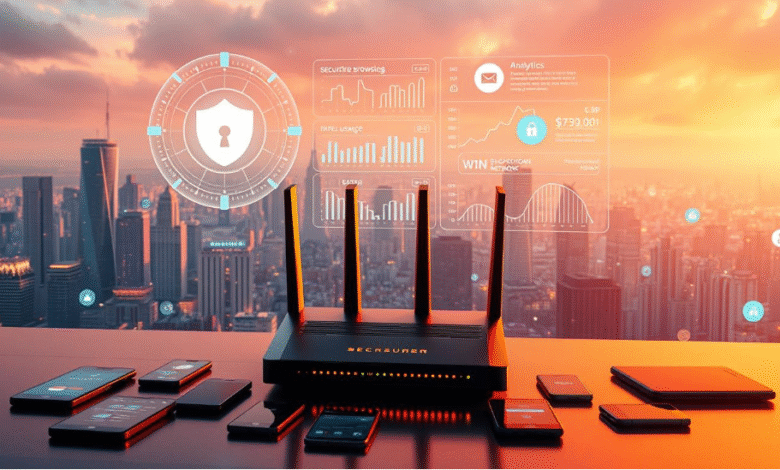Trends, Risks & Privacy Solutions

The digital era is reshaping the internet access landscape with rapid growth and challenges. Digital trends are creating new opportunities and increasing privacy risks. Secure internet access has become essential, driving the need for advanced technologies and solutions.
Online privacy solutions are emerging as key tools, fueled by innovation. They aim to protect and empower users worldwide. This is crucial in today’s digital world.
Exploring the evolving internet connectivity landscape is vital. We witness advancements that improve user experience but also blur the lines between public and private spaces. This has led to a heightened focus on online privacy solutions.
These solutions aim to create a safe digital sanctuary. As we move forward, we must balance the pursuit of secure internet access with the protection of our online presence.
Emerging Trends in Internet Access
The internet technology landscape is rapidly changing, introducing groundbreaking trends that are reshaping global internet connectivity. Three trends are particularly noteworthy for their potential to transform the future: 5G technology, satellite internet access, and the Internet of Things (IoT).
5G Technology and Its Global Rollout
5G technology is becoming a key player in modern telecommunications, offering unparalleled data speeds and reliability. It’s crucial for enhancing global internet connectivity, enabling networks to handle large data transfers efficiently. As more countries and companies invest in 5G, internet service quality and reach are expected to soar, making the world more interconnected.
Satellite Internet: Connecting Remote Areas
Satellite internet access is a vital trend that’s changing how remote and underserved regions access the internet. By launching satellites, companies can provide fast internet to areas where traditional broadband is too expensive or impractical. This technology is key to closing the digital divide, bringing global network access to remote areas and promoting inclusivity and equal opportunities.
The Rise of IoT and Its Demand on Bandwidth
The Internet of Things (IoT) is growing fast, connecting more devices to the internet. From smart home gadgets to industrial IoT applications, the need for reliable internet connectivity is greater than ever. The increasing number of connected devices is straining current internet infrastructure, requiring advancements in bandwidth and networking to meet IoT’s data-intensive needs.
Understanding the Risks: Security Concerns in the Digital Age
The rise of internet accessibility has brought significant security challenges. Cybersecurity is now a top priority for both organizations and individuals. Data breaches are becoming more common, threatening personal digital privacy and trust in digital communications.

Online threats are evolving, with attackers finding new ways to exploit vulnerabilities. Cybersecurity protocols are crucial for a safer internet. As internet use grows, so do digital privacy concerns, making it essential for users to protect their information.
Data breaches can cause financial losses and damage reputations, leading to long-lasting impacts. These disruptions highlight the need for enhanced security measures. Understanding these risks is the first step towards a more secure online world, where privacy and integrity can be preserved.
The Role of Free VPN in Ensuring Online Privacy
In today’s fast-paced digital world, safeguarding personal privacy online is paramount. Data breaches and surveillance have surged, making free VPN services indispensable. These Virtual Private Networks offer a security layer, ensuring online anonymity and secure browsing.

Understanding How VPNs Work
A VPN routes your internet connection through its server, not your ISP. This means your data appears to come from the VPN, not your device. By encrypting your data, VPNs protect it from hackers and unauthorized access. Your online activities become virtually untraceable, enhancing your privacy.
The Importance of Choosing the Right VPN
While free VPN options are tempting, evaluating their benefits is crucial. Not all VPNs offer equal security. Some may log your activities, which could be compromised. Opting for a reputable VPN ensures your security and privacy are safeguarded. Reliable review sites like vpnly.com can help you find a service that prioritizes your safety with strong encryption and a no-logs policy.
VPNLY as a Privacy Solution
VPNLY emerges as a top privacy-focused solution. It employs advanced encryption for secure browsing and online anonymity. With a vast server network worldwide, VPNLY allows users to bypass geo-restrictions while maintaining fast speeds. Reviews on vpnly.com confirm VPNLY’s reliability and efficiency, making it a leading free VPN provider.
Conclusion
The internet access landscape is rapidly changing, with trends like 5G, satellite internet, and the Internet of Things (IoT) leading the way. These advancements open up new avenues for innovation and connectivity. Yet, they also highlight the need to address complex security and privacy challenges with utmost care.
Protecting our digital identity is crucial in this evolving environment. Free VPN services play a key role in this effort, providing encryption and anonymity. By using these tools, we can responsibly harness technology, reducing our digital footprint and safeguarding our online activities.
As we look to the future, staying informed and proactive in digital protection is essential. Implementing strong security measures and learning about digital hygiene best practices will help us navigate the internet access future confidently. Embracing technology responsibly and using the appropriate tools ensures our online presence remains secure and progressive.




